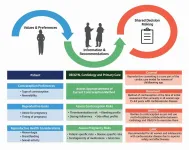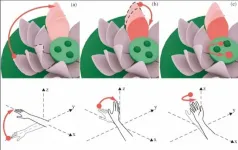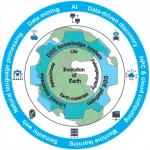(Press-News.org) A growing body of evidence suggests that biodiversity loss increases our exposure to both new and established zoonotic pathogens. Restoring and protecting nature is essential to preventing future pandemics. So reports a new Proceedings of the National Academy of Sciences (PNAS) paper that synthesizes current understanding about how biodiversity affects human health and provides recommendations for future research to guide management.
Lead author Felicia Keesing is a professor at Bard College and a Visiting Scientist at Cary Institute of Ecosystem Studies. She explains, "There's a persistent myth that wild areas with high levels of biodiversity are hotspots for disease. More animal diversity must equal more dangerous pathogens. But this turns out to be wrong. Biodiversity isn't a threat to us, it's actually protecting us from the species most likely to make us sick."
Zoonotic diseases like COVID-19, SARS, and Ebola are caused by pathogens that are shared between humans and other vertebrate animals. But animal species differ in their ability to pass along pathogens that make us sick.
Rick Ostfeld is a disease ecologist at Cary Institute and a co-author on the paper. He explains, "Research is mounting that species that thrive in developed and degraded landscapes are often much more efficient at harboring pathogens and transmitting them to people. In less-disturbed landscapes with more animal diversity, these risky reservoirs are less abundant and biodiversity has a protective effect."
Rodents, bats, primates, cloven-hooved mammals like sheep and deer, and carnivores have been flagged as the mammal taxa most likely to transmit pathogens to humans. Keesing and Ostfeld note, "The next emerging pathogen is far more likely to come from a rat than a rhino."
This is because animals with fast life histories tend to be more efficient at transmitting pathogens. Keesing explains, "Animals that live fast, die young, and have early sexual maturity with lots of offspring tend to invest less in their adaptive immune responses. They are often better at transmitting diseases, compared to longer-lived animals with stronger adaptive immunity."
When biodiversity is lost from ecological communities, long-lived, larger-bodied species tend to disappear first, while smaller-bodied species with fast life histories tend to proliferate. Research has found that mammal hosts of zoonotic viruses are less likely to be species of conservation concern (i.e. they are more common), and that for both mammals and birds, human development tends to increase the abundance of zoonotic host species, bringing people and risky animals closer together.
"When we erode biodiversity, we favor species that are more likely to be zoonotic hosts, increasing our risk of spillover events," Ostfeld notes. Adding that, "Managing this risk will require a better understanding of how things like habitat conversion, climate change, and overharvesting affect zoonotic hosts, and how restoring biodiversity to degraded areas might reduce their abundance."
To predict and prevent spillover, Keesing and Ostfeld highlight the need to focus on host attributes associated with disease transmission rather than continuing to debate the prime importance of one taxon or another. Ostfeld explains, "We should stop assuming that there is a single animal source for each emerging pathogen. The pathogens that jump from animals to people tend to be found in many animal species, not just one. They're jumpers, after all, and they typically move between species readily."
Disentangling the characteristics of effective zoonotic hosts - such as their immune strategies, resilience to disturbance, and habitat preferences - is key to protecting public health. Forecasting the locations where these species thrive, and where pathogen transmission and emergence are likely, can guide targeted interventions.
Keesing notes, "Restoration of biodiversity is an important frontier in the management of zoonotic disease risk. Those pathogens that do spill over to infect humans--zoonotic pathogens--often proliferate as a result of human impacts." Concluding, "As we rebuild our communities after COVID-19, we need to have firmly in mind that one of our best strategies to prevent future pandemics is to protect, preserve, and restore biodiversity."
INFORMATION:
This research was supported by a National Science Foundation Grant OPUS 1948419 to Keesing.
Cary Institute of Ecosystem Studies is an independent nonprofit center for environmental research. Since 1983, our scientists have been investigating the complex interactions that govern the natural world and the impacts of climate change on these systems. Our findings lead to more effective management and policy actions and increased environmental literacy. Staff are global experts in the ecology of: cities, disease, forests, and freshwater.
EAST LANSING, Mich. - Nine of the hottest years in human history have occurred in the past decade. Without a major shift in this climate trajectory, the future of life on Earth is in question, which poses a new question: Should humans, whose fossil fueled society is driving climate change, use technology to put the brakes on global warming?
Michigan State University community ecologist Phoebe Zarnetske is co-lead of the Climate Intervention Biology Working Group, a team of internationally recognized experts in climate science and ecology that is bringing science to bear on the question and consequences of geoengineering a cooler Earth.
The group's ...
BOSTON - Addiction is associated with social exclusion, loss of access to resources, and general disengagement from civic life. Now, a study recently published in the journal Psychology of Addictive Behaviors and led by David Eddie, PhD, of the Massachusetts General Hospital's Recovery Research Institute has found that the majority of Americans who have resolved an alcohol or other drug problem report achievements related to self-improvement, family engagement, and civic and economic participation since resolving their addiction. Additionally, it appears these achievements accumulate with time in addiction recovery.
Incorporating data from the Recovery Research Institute's landmark 2017 National Recovery Study, which indicated ...
A new study by Stanford University biologists finds an explanation for the idea that physical characteristics such as skin pigmentation are "only skin deep." Using genetic modeling, the team has found that when two populations with distinct traits combine over generations, traits of individuals within the resulting "admixed" population come to reveal very little about individuals' ancestry. Their findings were published March 27 in a special edition of the American Journal of Physical Anthropology on race and racism.
"When two founding groups first come together, a visible physical trait that differed between those founders initially carries information about the genetic ancestry of admixed individuals," says Jaehee Kim, a postdoctoral research fellow in biology at Stanford and first author ...
In the fight against cancers, activating mutations in the RAS family of genes stand in the way of finding viable treatment options. Now, scientists at the University of Missouri and Yale University have discovered that one of these mutations -- oncogenic RAS or RASV12 -- is also responsible for the regrowth of cancer cells following genotoxic therapy treatment, or drugs that cause damage to a cancer cell's DNA in order to eliminate it from the body.
"Most of our knowledge of how cells respond to DNA damage is mainly derived from studies looking at the single cell level," said Yves Chabu, an assistant professor in the MU College of Arts and Science. "Therefore, we don't know much about how tumor cells respond to DNA damage in the broader ...
URBANA, Ill. ¬- If your day started with a cup of coffee, there's a good chance your morning brew came from Colombia. Home to some of the finest Arabica beans, the country is the world's third largest coffee producer. Climate change poses new challenges to coffee production in Colombia, as it does to agricultural production anywhere in the world, but a new University of Illinois study shows effects vary widely depending on where the coffee beans grow.
"Colombia is a large country with a very distinct geography. The Andes Mountains cross the country from its southwest to northeast corner. Colombian coffee is currently growing in areas with different altitude levels, and climate impacts will likely be very different for low ...
Pregnancy can increase the risk of morbidity and mortality in women with cardiovascular disease; however, many cardiologists are not having pre-pregnancy contraception discussions with their patients of child-bearing age. There is a need to provide evidence-based guidance for contraceptive safety and effectiveness and pregnancy planning options for this high-risk patient group, according to a paper published in the Journal of the American College of Cardiology (JACC). This paper is one of a five-part JACC focus seminar series addressing a wide range of topics in the emerging cardio-obstetrics field.
Prior research has found that 68% of females have had sex at least once by the time they were 17, ...
A recent study proposed a three-dimensional LotusMenu that can "bloom in the palm". With this menu, even if you are not Nezha, you can also control your own lotus.
The research paper is titled: "LotusMenu: A 3D Menu using Wrist and Elbow Rotation Inspired by Chinese Traditional Symbol". It's published in SCIENCE CHINA Information Sciences recently, written by Associate Professor Lu Fei's human-computer interaction research team from Beijing University of Posts and Telecommunications. Based on the metaphor of the traditional lotus pattern, the researchers ...
The Bureau of Reclamation today released final technical reports supporting the Water Reliability in the West - 2021 SECURE Water Act Report. Reclamation's 2021 West-Wide Climate and Hydrology Assessment and seven individual basin reports provide detailed information on climate change impacts and adaptation strategies to increase water supply reliability in the West. A new 2021 SECURE Report Web Portal is also available to provide a user-friendly, web-based format for delivery of information in the reports.
"Western water supply and delivery systems are affected by changing hydrologic conditions and competing demands," Deputy Commissioner Camille Calimlim Touton said. "These reports highlight Reclamation's effort to use ...
Humans have long explored three big scientific questions: evolution of the universe, evolution of Earth, and evolution of life. Geoscientists have embraced the mission of elucidating the evolution of Earth and life, which are preserved in the information-rich but incomplete geological record that spans more than 4.5 billion years of Earth history. Delving into Earth's deep-time history helps geoscientists decipher mechanisms and rates of Earth's evolution, unravel the rates and mechanisms of climate change, locate natural resources, and envision the future of Earth.
Two common approaches, deductive reasoning ...
Researchers from North Carolina State University have developed an exosome-coated stent with a "smart-release" trigger that could both prevent reopened blood vessels from narrowing and deliver regenerative stem cell-derived therapy to blood-starved, or ischemic, tissue.
Angioplasty - a procedure that opens blocked arteries - often involves placing a metal stent to reinforce arterial walls and prevent them from collapsing once the blockage is removed. However, the stent's placement usually causes some injury to the blood vessel wall, which stimulates smooth muscle cells to proliferate and migrate to the site in an attempt to repair the injury. The result is restenosis: a re-narrowing of the blood vessel previously opened by angioplasty.
"The ...






